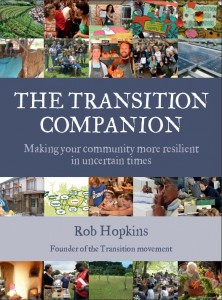8 Nov 2011
The Transition Companion reviewed…
 Here is another review of ‘The Transition Companion’, this time by Jeremy Williams at Make Wealth History.
Here is another review of ‘The Transition Companion’, this time by Jeremy Williams at Make Wealth History.
If you’re a transitioner yourself, chances are you’re well aware of this book. You may even have a hand in it somewhere, having sent in a story, a photo or a quote. You may have read the draft chapters as they were posted on Rob’s Transition Culture blog, or suggested a title. The Transition Companion: Making your community more resilient in uncertain times is the follow-up to The Transition Handbook. Where the first book proposed a movement and speculated about how it might be created, the second reports on a dynamic and growing world of Transition. It is packed with examples, stories, experience and friendly advice, gathered together from Transition groups around the UK and as far afield as Brazil and South Africa. It is a crowd-sourced answer to the book’s central question: “What would it look like if the best responses to peak oil and climate change came not from committees and acts of parliament, but from you and me and the people around us?”
It takes a whole book to explore that question because the answer is diverse. There is no one way to transition your town or city beyond fossil fuels. Only tailor made local approaches are going to work, approaches that honour local history and tradition, and that respond to the specific needs of people and place. But in exploring what others are doing, in looking at what has worked, and what has failed and why, certain patterns emerge – good ideas to try and pitfalls to avoid.
Those ideas are written up as ‘ingredients’ and tools for setting up and running a transition initiative, things to consider or to think through – how to live up to the claim of being inclusive; should you have an office or not; celebrating failures as well as successes; mini how-tos on fund raising and public speaking. Whether you’re starting out or well on already, there’s plenty here to learn from.
In keeping with the ‘pattern language‘ inspiration of the book, it is divided into short numbered sections. Each has a one or two sentence summary at the start, and a ‘you may also enjoy’ box at the end. It makes the book easy to dip in and out of, browsing the bits you’re most interested in or are most relevant. The ‘companion’ title an apt one.
If you’re new to the whole concept of Transition, The Transition Handbook has more detailed explanations of why a transition is necessary, and how the ideas were developed. If you’re familiar with the ideas and want to see how they are being worked out in practice, this is the one to go for.
For me personally, it’s great to see the little contributions from Transition Luton and know we’ve been able to contribute to the conversation. (And to find this article on Japan referenced in a mention of post-growth economies.) It’s also a kick up the backside to get stuck in again after something of a hiatus after becoming a dad, and I have a list of things to do and try scribbled on the inside back cover. Actually, the book ought to come with a warning: ‘this book will leave you with no excuses left for not getting involved in Transition.’
That sense of an invitation is not accidental. Rob puts it himself towards the end of the book, describing The Transition Companion as “the current thinking about what transition is and how it works – an invitation to pick it up, try it out, see if it works for you and, if so, make it yours.”